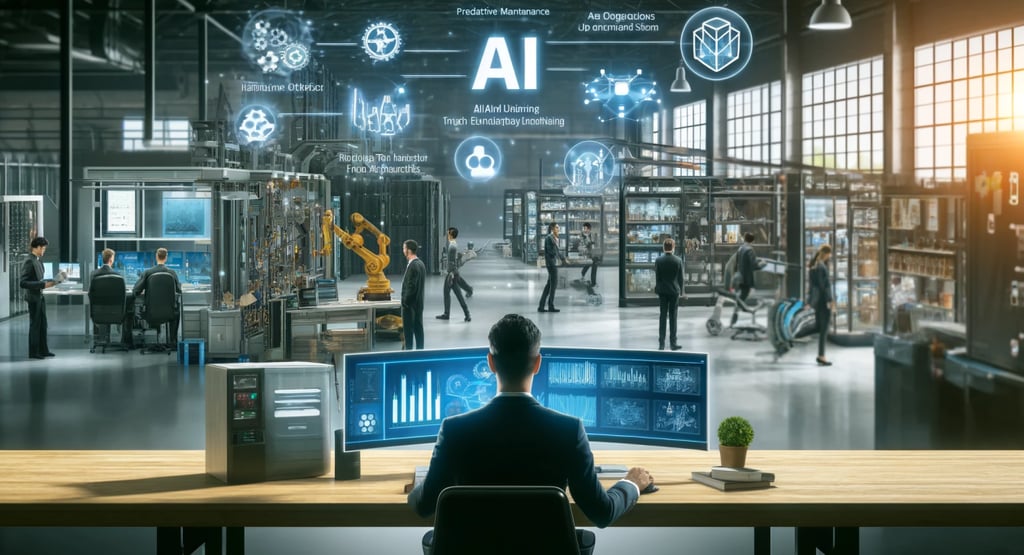The Strategic Imperative of Integrating AI Across Company Operations
Integrating AI into all components of a company's strategy is vital, you didn't need to deploy AI in all components but you do need to address it.
Matthew Alberts, Ph.D.
6/1/20244 min read


In today's rapidly evolving technological landscape, Artificial Intelligence (AI) has emerged as a transformative force across various industries. While much attention has been given to the implementation of AI technologies, it is equally important for companies to incorporate a comprehensive understanding of AI concepts into their strategic planning. This approach ensures that businesses are not just reactive but proactive in leveraging AI to drive innovation and efficiency. Here, we explore why understanding AI is vital across all areas of company strategy, from operations to HR, and delve into concepts such as automated reasoning, special purpose intelligence, and operational modal analysis.
AI in Operations:Beyond Automation
Integrating AI into operations goes beyond mere automation of tasks. It's about optimizing processes, enhancing decision-making, and creating value through intelligent systems. AI-driven predictive maintenance, for instance, uses machine learning algorithms to predict equipment failures before they happen, saving costs and reducing downtime. Automated reasoning allows AI to mimic human problem-solving abilities, enabling it to make logical decisions based on available data. This capability can significantly improve operational efficiency by identifying bottlenecks and optimizing workflows.Consider the supply chain: AI can analyze vast amounts of data to forecast demand more accurately, manage inventory in real-time, and optimize logistics routes. By doing so, companies can reduce waste, lower costs, and improve customer satisfaction. Additionally, AI-driven quality control systems can inspect products at a speed and accuracy far beyond human capabilities, ensuring higher standards and reducing defects.As Thomas Edison famously said, "There is no substitute for hard work." While AI can significantly enhance operations, the hard work lies in understanding and integrating these technologies effectively. It requires a thorough grasp of AI principles to ensure that their application brings genuine improvements.
Strategic AI in Human Resources
In the realm of Human Resources (HR), AI can revolutionize recruitment, employee engagement, and performance management. Special purpose intelligence, which refers to AI systems designed for specific tasks, can streamline the hiring process by using algorithms to screen resumes and predict candidate success. These AI systems can analyze a candidate’s work history, education, and even social media profiles to provide insights into their potential fit within the company culture.Moreover, AI-powered chatbots can handle routine HR inquiries, freeing up HR professionals to focus on more strategic initiatives. AI can also play a crucial role in employee retention by analyzing data from employee surveys, performance reviews, and other sources to identify at-risk employees and suggest interventions. Predictive analytics can help in succession planning by identifying potential leaders within the organization based on their performance metrics and career trajectories.Understanding these AI concepts helps HR professionals to harness AI tools effectively, ensuring that they complement rather than replace human judgment. By leveraging AI, HR departments can not only improve efficiency but also enhance the overall employee experience, making the company a more attractive place to work.As depicted in the movie "Her," where the AI system Samantha evolves and develops complex emotional responses, it underscores the potential of AI to transform human relationships. While today's AI in HR may not reach Samantha's level, it certainly has the power to transform how companies interact with and manage their employees.
The Role of Operational Modal Analysis
Operational Modal Analysis (OMA) is a critical concept for understanding how systems behave under operational conditions without artificial excitation. In the context of AI, OMA can be used to monitor and improve the performance of AI systems in real-time. This involves analyzing data from AI operations to detect patterns and anomalies that could indicate potential issues or areas for improvement.For instance, in manufacturing, OMA can help monitor the health of machinery by analyzing vibrations and other operational data to detect signs of wear and tear. This proactive approach allows for maintenance to be scheduled before a failure occurs, reducing downtime and maintenance costs.In the realm of AI systems themselves, OMA can be used to ensure that algorithms continue to perform as expected as they are exposed to new data and conditions. This is particularly important for machine learning models that need to adapt to changing environments without degrading in performance. By continuously monitoring and analyzing operational data, companies can ensure that their AI systems remain robust, reliable, and effective.
The Vital Role of Conceptual Understanding
While the implementation of AI technologies is important, a deep understanding of AI concepts is even more crucial. This knowledge empowers leaders and employees to make informed decisions about where and how to integrate AI into their business strategies. It also fosters a culture of innovation, as teams are more likely to explore and experiment with AI solutions when they understand the underlying principles.Understanding AI concepts such as machine learning, neural networks, and natural language processing enables companies to identify the most suitable AI applications for their specific needs. It also helps in setting realistic expectations and avoiding the hype that often surrounds AI technologies.Moreover, a solid grasp of AI concepts is essential for ethical AI implementation. As AI systems become more integrated into decision-making processes, it is crucial to ensure that they are used responsibly and transparently. Understanding the potential biases and limitations of AI can help companies develop fair and equitable AI policies that protect both the organization and its stakeholders.
In Closing
Incorporating AI into company strategy is not just about deploying the latest technologies; it is about cultivating a profound understanding of AI concepts across all levels of the organization. From operations to HR, the ability to grasp concepts like automated reasoning, special purpose intelligence, and operational modal analysis will enable companies to harness AI's full potential. By prioritizing this understanding, businesses can ensure they remain competitive and innovative in an increasingly AI-driven world.
